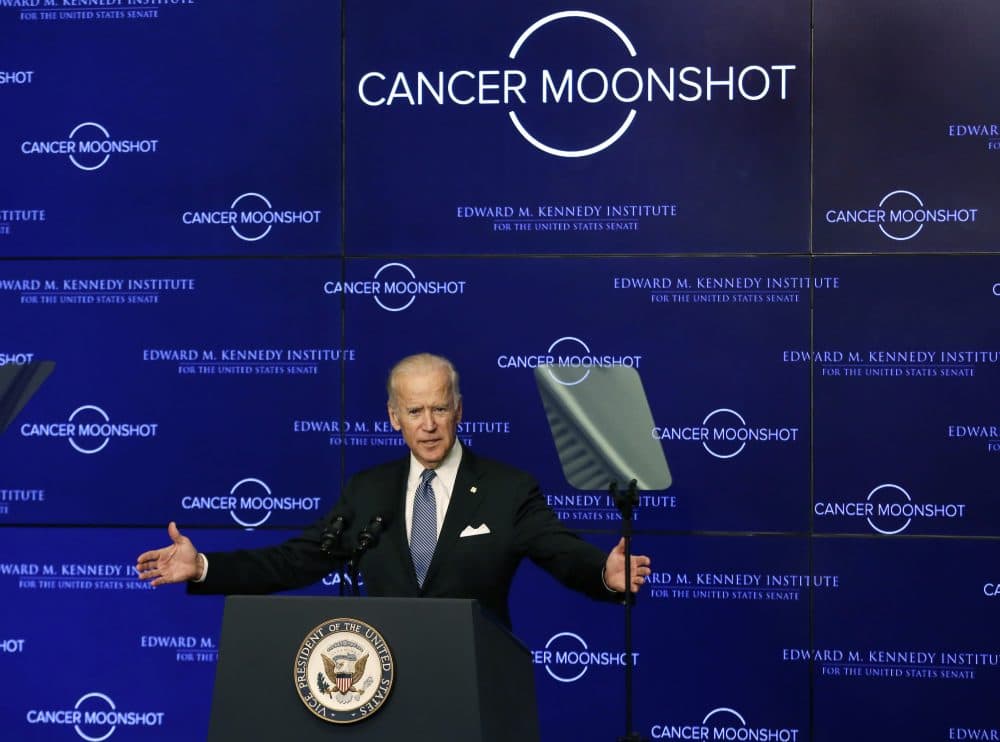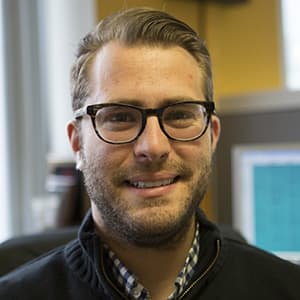Advertisement
Where Is Boston's Groundbreaking Cancer Research Headed?
Resume
As part of WBUR's special series "This Moment In Cancer," we hear about where Boston's groundbreaking cancer research is headed.
Guest
Tyler Jacks, director of the Koch Institute for Integrative Cancer Research at MIT, which tweets @kochinstitute.
Partial Transcript
MC: Do you feel that excitement that Vice President Biden was talking about?
TJ: I most certainly do, I completely agree with everything he’s said. We are living through a remarkable time where we’re translating this investment that we’ve made in cancer science to new treatments. And they’re benefiting a large number of people and they will benefit many more in the years to come.
MC: Why? What’s so different now, what’s coming together that we haven’t had come together in the decades of battling this disease?
TJ: I think it’s important to put it into perspective. He referenced the War on Cancer in 1971 — in 1971 we knew nothing about how cancers really arose. And in the time since then, thanks to the investment and research that that enabled, we’ve learned a great deal. In 1971 we didn’t know of a single cancer gene. Now we sequence cancer genomes at will. We know of hundreds of cancer genes, and we have developed new drugs that target many of those and thereby provide precision medicines for cancer.
MC: So we have technologies coming together, we have different branches of the biomedical sciences coming together, we have this nexus here in Boston that seems perfectly set up for that. I want to explore that more in just a moment, but Professor Jacks, it’s still the second leading cause of death — the second leading killer in America — cancer is. Are we at risk of being too optimistic of the steps forward that we could take here right now?
TJ: We certainly do have to be realistic about where we stand. It is the case that cancer is the second-leading cause of deaths in the U.S., in fact, in nearly half the states it’s the leading cause of death. And we have a ways to go. This year alone, 600,000 Americans will die from cancer. 8.2 million people in the world will die from cancer. And so we have a long way to go, but the progress that we’ve seen in recent years, has been so dramatic in so many cases that I think we can safely project ahead that we have turned the corner and those numbers will begin to come down, and eventually we will be in a position to control this disease much more effectively.
MC: That’s actually quite a bold statement, to, in your words, safely say that we have turned the corner. You feel that confident about it?
TJ: I do. I do. And I base it on real evidence. For certain cancers, take chronic myelogenous leukemia [for example], which 15 years ago was a death sentence, and patients were treated with conventional chemotherapy, and and 75% of them were dead three or five years later. Today those same patients are treated with one of the targeted therapies, and virtually all of them survive, with virtually no side effects. Just as one example, that’s the classic example — but it’s not gonna be the only example. There are many other drugs of that sort, there’s new strategies to use the immune system to mobilize cells of the immune system against cancer which are showing great effect in other diseases, so I think this is not wishful thinking. This is based on real, solid evidence in the clinic, which will make a huge impact in the years ahead.
MC: So give us a little 101 on how these targeted gene therapies work, for people who don’t understand the technology, what’s so different about it?
TJ: So cancer cells arise from normal cells, because genes get altered. You can sometimes equate some of those genes with the accelerator in your car getting stuck in the "on" position. The cells get stimulated to divide inappropriately. These targeted therapies reverse that effect. They block the accelerator from getting stuck, they remove that signal, and it causes the cells to stop dividing, or in some cases, to die. Now importantly, there are many such genes, and so there’s not a cure all, there’s not just one drug, you need to develop a suite of these things to target each individual alteration for an individual’s cancer type.
MC: So they’re that specialized, they’re that customized?
TJ: There are many many genes and therefore there will be many many targeted therapies. It’s not to say that every last cancer has its own individual mutation or set of mutations. There are patterns and so forth. But we do need an arsenal of these drugs. Cancer is complex and therefore there is not a one-size-fits-all solution.
MC: Interesting. So when you say “cancer is complex,” it leads me to wonder — we’ve been discussing this in our office today, that it seems as if for some time now researchers have said that cancer is not just one disease, but a variety of diseases. What does that mean?
TJ: I can make that more complicated for you, in fact. So that typically refers to the fact that cancer is a set of diseases affecting many different tissues. Lung cancer, breast cancer, prostate cancer, but it’s not just that. There are many forms of lung cancer, or breast cancer — but it’s not just that. Because actually, as cancers develop in an individual patient, an individual cancer cell might be different — a little bit different — from the cell that’s sitting right next to it. And so there’s heterogeneity, we call it. It makes the problem that much harder.
MC: We’ve seen those glimmers of hope before that somewhat faded away.
TJ: Let me contrast the current situation with then. Judah Folkman was a pioneering scientist and did very important work in that area. It did lead to the development of cancer drugs, and actually didn’t work that well. But they were over-hyped. The New York Times published that we would “cure cancers in two to three years” — this is a proclamation from Jim Watson, a Nobel Prize winner. That’s over-promising. We didn’t know enough to actually say that. And they were wrong.
In this case, what I’m saying is based on data from patients in the clinic who are living longer thanks to these new treatments. Now I do not want to suggest that tomorrow or next year or five years from now or ten, cancer will be a thing of history — it’s not true. There’s still a long way to go. My point is that the progress has been such in the recent years that it’s safe to project that we will get there.
MC: So a lot of excitement around immunotherapy, that’s harnessing the immune system to fight cancers. Tell us a bit more about that — but I’ve also heard there are some significant and potential downsides to this one.
TJ: So immunotherapies — broadly — stimulate the immune system to recognize and eliminate your cancer cells as though they were foreign. Like they eliminate bacteria or virally infected cells. Cancer cells are different from your normal cells. They derive from normal cells but become different through this mutational process. We now know that if we can stimulate the immune system to see those cancers as foreign, to wake up the immune system, those cells can in fact recognize and eliminate the cancers cells. And there are many examples where this has worked. Former president Jimmy Carter is alive today because immunotherapy worked to cure his metastatic melanoma with metastases to his brain. That was a death sentence not long ago. He is now cancer-free.
There are many other patients in that category. So these new immunotherapies work. The challenge is that if you stimulate your immune system, it might get over-stimulated. And it might actually start causing harm to normal cells in your body. So we have to work a balance between attacking the cancer and not attacking yourself. And frankly speaking we’re still figuring out those rules.
MC: What is it about Boston, or the Boston area that seems to make [the city] such a locus of this cutting-edge research on cancer right now?
TJ: We have a tremendous number of cancer researchers, and we have some of the best in the world. So the great institutions in Boston — MIT, Harvard, BU, BC, Tufts — they attract the best of researchers from around the world. They’re well-resourced as well. And I think we take a very bold approach to the disease. We try to do transformative things here. I run a cancer center at MIT where we’re trying to really push on the cutting edge of science and technology. And because there are so many of us, we have the opportunity to interact and collaborate, and work across institutions. And that gives us a distinctive advantage.
MC: Did you ever feel a sense of frustration that we hadn’t been making more progress?
TJ: Absolutely. It’s a slow road. Cancer research — any type of biomedical research — takes time. And takes patience, and perseverance. And I and all of my colleagues have suffered through the trials and tribulations of failed experiments. But you have to keep going. Fortunately, with the collective effort of all of us in this community, we’ve made great progress and now, for sure, it’s paying off to the benefit of patients.
This segment aired on January 31, 2017.

